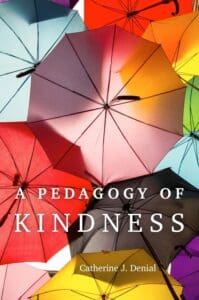Book Clubs
See what the Center for Faculty Excellence is reading during Spring 2025!
REGISTER FOR A BOOK CLUB!
After registration, you will receive meeting information (including a Zoom link, if applicable) as well as Outlook calendar invitations, and shortly thereafter, the book will be sent to your home.
A Pedagogy of Kindness
Book Club Facilitator: Emily Hixon, Director of the Center for Faculty Excellence
Book Club Facilitator: Meghan Cook, Asst. Director of the Center for Faculty Excellence

Book Author: Catherine J. Denial
Book Description (Excerpted from Amazon):
Academia is not, by and large, a kind place. Individualism and competition are what count. But without kindness at its core, Catherine Denial suggests, higher education fails students and instructors—and its mission—in critical ways. Part manifesto, part teaching memoir, part how-to guide, A Pedagogy of Kindness urges higher education to get aggressive about instituting kindness, which Denial distinguishes from niceness. Having suffered beneath the weight of just “getting along,” instructors need to shift every part of what they do to prioritizing care and compassion—for students as well as for themselves. A Pedagogy of Kindness articulates a fresh vision for teaching, one that focuses on ensuring justice, believing people, and believing in people. Offering evidence-based insights and drawing from her own rich experiences as a professor, Denial offers practical tips for reshaping syllabi, assessing student performance, and creating trust and belonging in the classroom. Her suggestions for concrete, scalable actions outline nothing less than a transformational discipline—one in which, together, we create bright new spaces, rooted in compassion, in which all engaged in teaching and learning might thrive.
Book Club Meeting Dates (Two Options)
- In-person Book Club
- Feb 12, 2 to 3:30 p.m., in-person only, TBD, Hammond
- March 12, 2 to 3:30 p.m., in-person only, TBD, Hammond
- April 9, 2 to 3:30 p.m., in-person only, TBD, Hammond
- Virtual Book Club
- Feb 13, 9 to 10:30 a.m., virtual only
- March 13, 9 to 10:30 a.m., virtual only
- April 10, 9 to 10:30 a.m., virtual only
Books Read in Previous Book Clubs
Revisit the books that the Center for Faculty Excellence has used in previous book clubs.
- First Gen: A Memoir by Alejandra Campoverdi (Fall 2024)
- Teaching with AI: A Practical Guide to a New Era of Human Learning by Jose Antonio Bowen and C. Edward Watson (Fall 2024)
- The Sustainability Mindset Principles: A Guide to Developing a Mindset for a Better World by Isabel Rimanoczy (Summer 2024)
- The Souls of Black Folk by W. E. B. Du Bois (Summer 2024)
- The Parrot and the Igloo: Climate and the Science of Denial by David Lipsky (Summer 2024)
- Atlas of the Heart by Brené Brown (Summer 2024)
- The Happiness Advantage: How a Positive Brain Fuels Success in Work and Life by Shawn Achor (Spring 2024)
- Ask Powerful Questions: Create Conversations That Matter by Will Wise and Chad Littlefield (Spring 2024)
- Relationship-Rich Education: How Human Connections Drive Success in College by Peter Felten and Leo M. Lambert (Spring 2024)
- Inclusive Teaching: Strategies for Promoting Equity in the College Classroom by Kelly A. Hogan and Viji Sathy (Fall 2023)
- Faculty Burnout: Pathways to Reckoning and Renewal by Rebecca Pope-Ruark (Summer 2023)
- Under a White Sky: The Nature of the Future by Elizabeth Kolbert (Summer 2023)
- Make it Stick: The Science of Successful Learning by Peter C. Brown, Henry L. Roediger III, and Mark A. McDaniel (Spring 2023)
- The Power of Moments by Chip Heath and Dan Heath (Spring 2023)
- UNgrading: Why Rating Students Undermines Learning (and What to Do Instead), edited by Susan D. Blum (Fall 2022)
- How Humans Learn: The Science and Stories behind Effective College Teaching (Teaching and Learning in Higher Education) by Joshua R. Eyler (Summer 2022)
- College Students Sense of Belonging – A Key to Educational Success for All Students by Terrell L. Strayhorn (Summer 2022)
- Teach Students How to Learn: Strategies You Can Incorporate Into Any Course to Improve Student Metacognition, Study Skills and Motivation by Saundra Yancy McGuire (Spring 2022)
- Mindset: The New Psychology of Success, How we can learn to fulfill our potential by Carol S. Dweck, Ph.D. (Spring 2022)
- Whistling Vivaldi: How Stereotypes Affect Us and What We Can Do by Claude M. Steele (Fall 2021)
- Keeping Us Engaged: Student Perspectives (and Research-Based Strategies) on What Works and Why by Christine Harrington and 50 college students (Fall 2021)
- Becoming a Student-Ready College: A New Culture of Leadership for Student Success by Tia Brown McNair, et al. (Summer 2021)
- Bandwidth Recovery: Helping Students Reclaim Cognitive Resources Lost to Poverty, Racism, and Social Marginalization by Cia Verschelden (Spring 2021)
- Small Teaching Online: Applying Learning Science in Online Classes by Flower Darby and James M. Lang (Fall 2020, Spring 2021)
- The Sun Does Shine: How I Found Life, Freedom and Justice by Anthony Ray Hinton (Fall 2020)
- Small Teaching: Everyday Lessons from the Science of Learning by James M. Lang (Spring 2020)
- The Disappearing Spoon: And Other True Tales of Madness, Love and the History of the World from the Periodic Table of the Elements by Sam Kean (Spring 2020)
- What the Best College Teachers Do by Ken Bain (Spring & Summer 2019)
- Generation Z Goes to College by Corey Seemiller and Meghan Grace (Fall 2019)